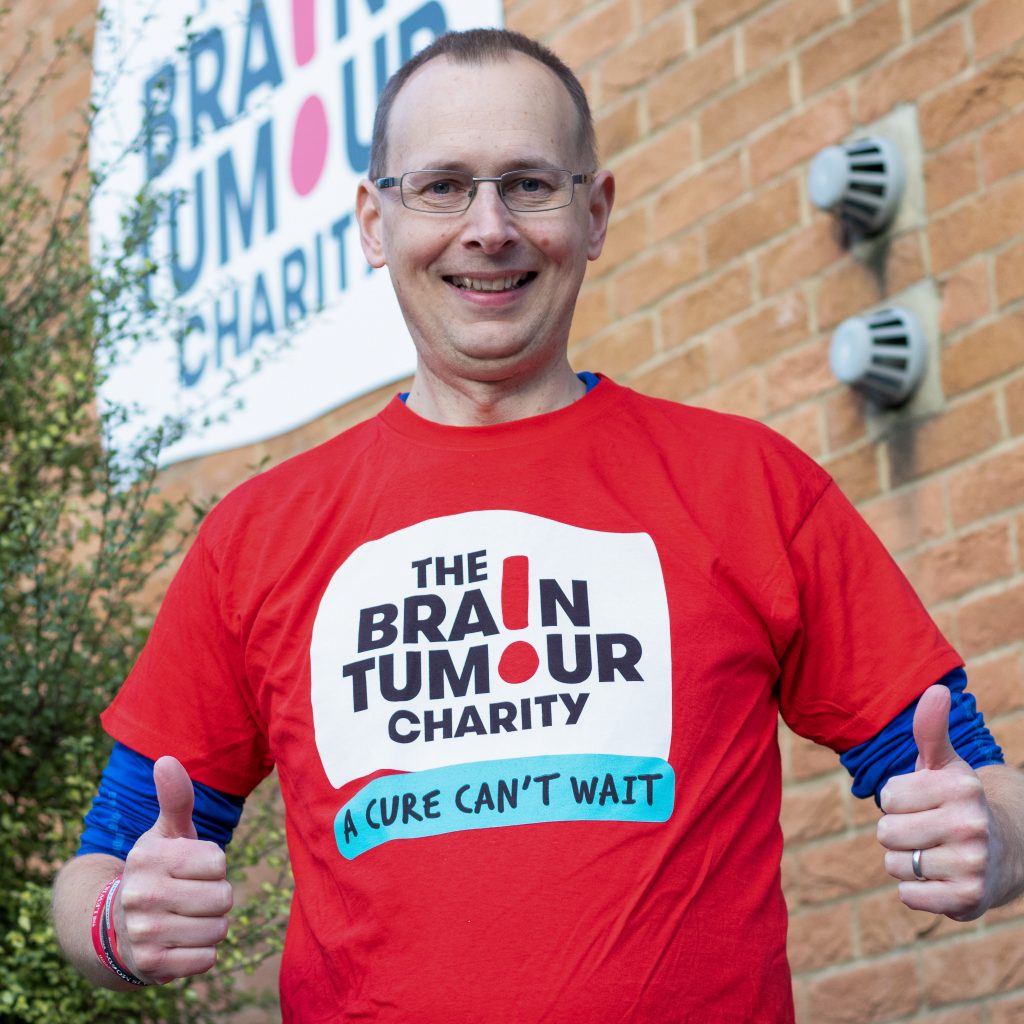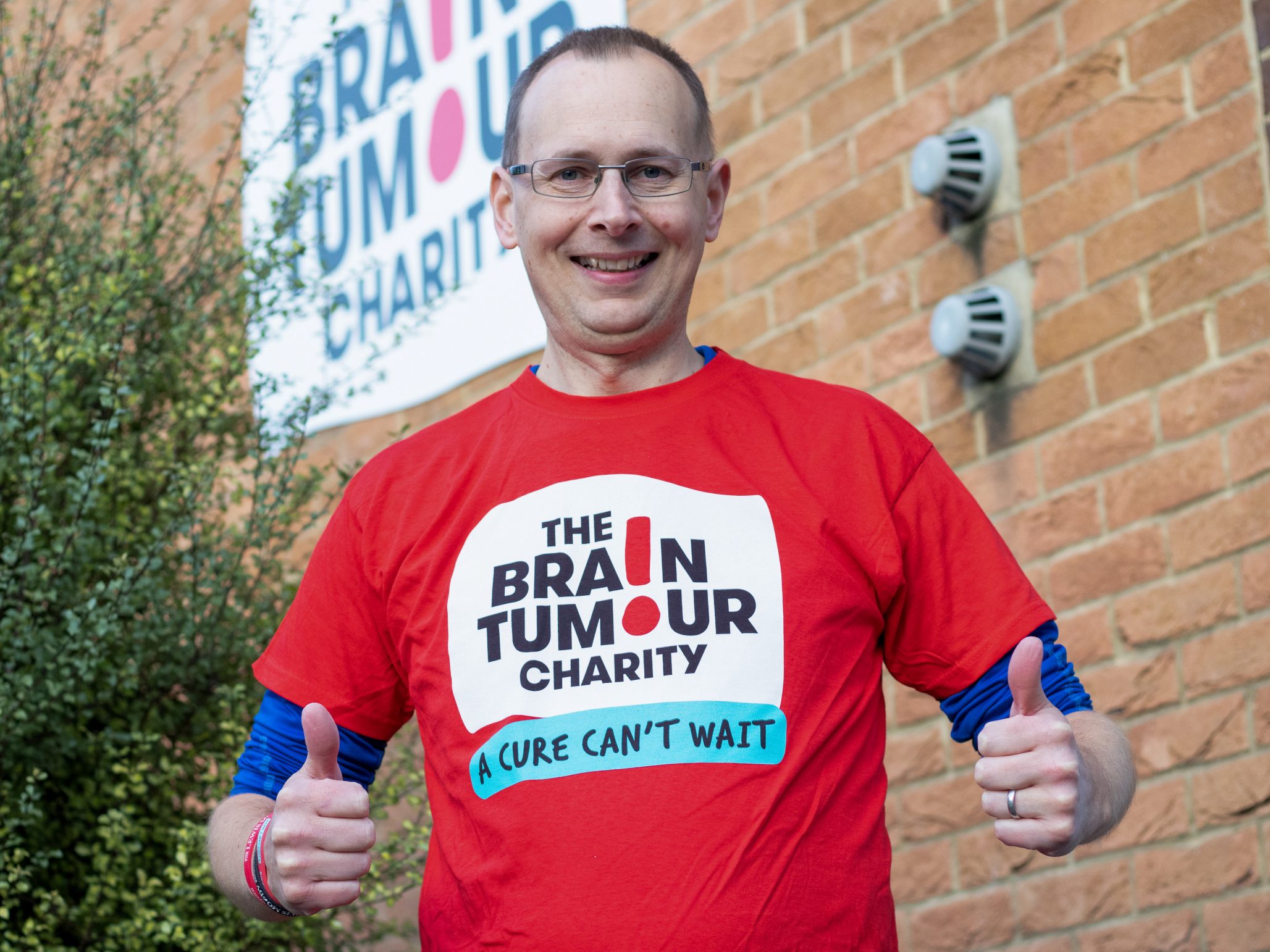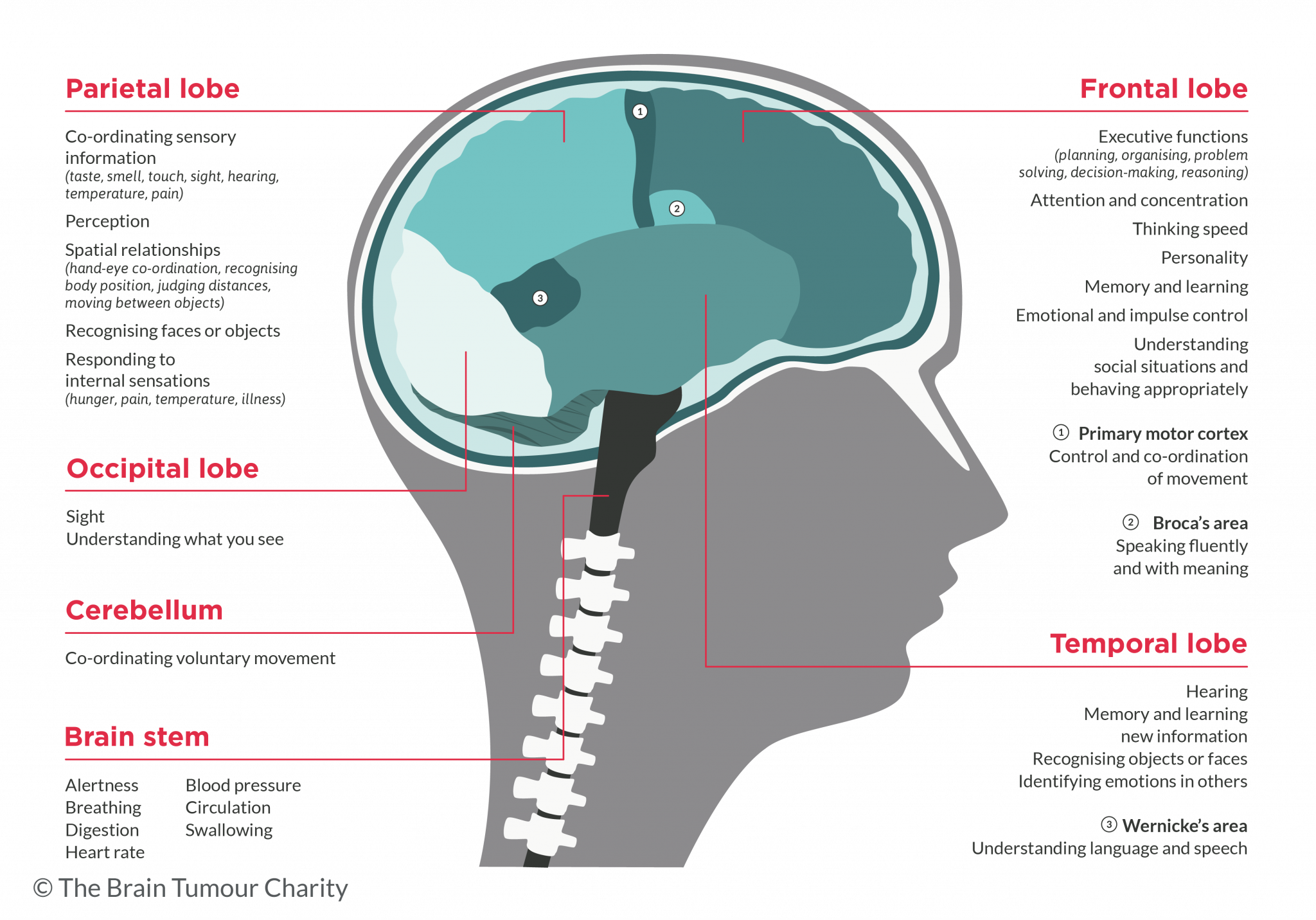Speech and language difficulties
Some people with brain tumours can have difficulty finding words when speaking, difficulty physically speaking, or can struggle using language. These speech and language difficulties can sometimes be caused by the location of your brain tumour or its treatment.
Short summary
It’s important to remember that not everybody who is affected by a brain tumour will have difficulty speaking. We found that 1 in 5 people we spoke to had speech and language difficulties caused by a brain tumour.
It’s also worth noting that different people have different symptoms and severity. So, you may not have the same difficulty speaking as someone with a similar diagnosis and treatment plan.
Below, we’ll discuss:
- What speech and language difficulties could I experience?
- What causes speech and language difficulties?
- Coping with speech and language difficulties
Get support
If you need someone to talk to or advice on where to get help, our Support and Information team is available by phone, email or live-chat.
Expert benefits & money advice
Benefits and Money Advice Clinic supported 339 people in the last financial year (22/23), to the tune of £807,938.
Get your free Information Pack
Our Brain Tumour Information Pack can help you better understand your diagnosis and feel confident talking to your medical team.

What speech and language difficulties could someone with a brain tumour diagnosis experience?
It is important to remember that no matter what speech and language difficulties somebody is experiencing, it does not mean that they’re:
- unintelligent
- unaware of what they want to say
- incapable of making all their own decisions
With this in mind, speech and language difficulties caused by a brain tumour might include:
Difficulty speaking and slurred speech
Speech involves the ability to use movements of the tongue, lips, jaw muscles and vocal tract to produce sounds.
So speech difficulties mean you find it physically difficult to speak. This may be due to the brain tumour affecting the control or co-ordination of the muscles involved in speaking.
The nature of your speech difficulty will depend upon the type, size and location of the tumour. You could experience the following:
Dysarthria
Dysarthria is a speech difficulty caused by weakness in the muscles needed for speaking and/or difficulty in controlling these muscles. Acquired dysarthria can result from a range of neurological disorders, including brain tumours. This is due to the muscles needed for speech being controlled by the brain and nervous system.
Common symptoms include:
- hesitant or slow sounding speech
- slurred speech
- an increase or decrease in speech volume
- strained voice
- poor intonation, e.g. a monotone quality
- nasal-sounding speech.
Apraxia (or dyspraxia) of speech
When we speak, the brain sends signals to our mouth to tell the muscles how and when to move. A brain tumour can prevent these signals from being sent properly. This means that the particular motor movements needed for us to be able to speak don’t always happen as intended. This is called apraxia of speech.
Common symptoms include:
- slow sounding speech
- effortful attempts in trying to move the lips, tongue or a jaw
- unable to pronounce the same word correctly each time
- difficulty with longer words
- difficulty saying individual sounds. This could include adding new sounds, omitting sounds or pronouncing the sounds incorrectly
Language difficulties and aphasia
Language means the words we use and how we put them together to communicate meaning. It’s involved when you’re trying to speak, listen, read or write.
Aphasia (sometimes called dysphasia) is the most common communication difficulty experienced by people with brain tumours. Aphasia is an impairment of language, which affects the production or comprehension of speech and the ability to read or write, due to damage to the brain.
It’s important to note that aphasia doesn’t affect intellect and there are various types of aphasia. Some of these are:
Expressive aphasia
Expressive aphasia (also known as Broca’s aphasia) can occur when you have damage to an area of the frontal lobe responsible for language production (Broca’s area).
You may find you have difficulty speaking and you may only be able to produce a small number of words in halting sentences, for example “want … tea … sugar”.
It’s usually possible for others to understand your speech, but it may take time to say what you want to.
People with expressive aphasia may:
- not be able to speak at all
- have difficulties speaking or writing in full sentences and may only use one or two words.
- speak with pauses or not be able to say the word they would like to say.
- get words muddled up, for example saying “mum” instead of “daughter” or confuse “yes” and “no”
- be able to describe an object, but not name it
- only be able to say a few words, which may be linked to emotions and could be swear words.
If you have expressive aphasia, you may not be aware your speech isn’t as you intend, but you’ll be aware you have a speech problem.
Receptive aphasia
Receptive aphasia (also known as Wernicke’s aphasia) can occur when there is damage to the part of the temporal lobe responsible for understanding language (Wernicke’s area).
This type of ‘receptive aphasia’ affects language comprehension and the ability to produce meaningful language. You may have speech that sounds fluent and has a normal rhythm, but consists of ‘made-up’ words.
As a result, other people won’t be able to understand what you’re trying to say. You may also be unable to understand what others are saying.
A person with receptive aphasia may also:
- not understand long sentences and forget the beginning of what has been said
- have difficulty understanding if there’s background noise or several people speaking at once
- be able to read single words but have difficulty with reading phrases or sentences
- be able to write, but not read back what they have written
In general, someone with receptive aphasia may not be aware they have a problem with speech and language.

I didn’t want to stop talking and engaging with people, so I pushed myself to keep speaking to people, and, if I got something wrong, I’d ask for help

Oliver Highway, diagnosed with a glioblastoma in 2012
“After surgery to debulk my brain tumour, I was told I had dysphasia (partial loss of my ability to speak and write), caused by the tumour and the surgery. I couldn’t remember words and often wrote gibberish. I had speech therapy and did improve, but it’s an ongoing effort to keep it at a good level.
“When your communication is affected, it can cause awkwardness and misunderstandings. I’ve learnt it helps to support the people you’re talking to. I pushed myself to keep speaking to people, and, if I got something wrong, I’d ask for help.
“I didn’t feel embarrassed because I started with friends first. This gave me confidence to speak to people when I went into town. And now I’ve also done speeches. If I forget a word, I ask the group to help and make it into a fun game.
“The most important thing I’ve learnt is to keep looking forward. Things might not go back to how they were, but the one thing you can do is crack on and be positive.“
Join one of our Online Support Communities for more stories and tips about coping with a brain tumour diagnosis from people who know what you’re going through.
What causes speech and language difficulties?

Location of tumour
Whether and how a brain tumour affects you will depend on where it is in the brain. Each section or lobe of the brain is responsible for different functions, some of which are involved in communication.
For example, the frontal lobe is involved in language production (how you express yourself) and the temporal lobe in understanding what others are saying to you and how your thought processes work. As a result, pressure from a tumour in one of these areas of the brain can affect your ability to speak and understand what others are saying.
Areas of the brain controlling language are generally found in the left hemisphere, so if this is where your tumour is, you’re more likely to experience language and speech difficulties. However, in some cases they’re found in the right hemisphere, for instance, with left-handed people.
Because our brains are responsible for controlling the muscles needed to produce speech, a brain tumour can also cause difficulty speaking by interrupting some signals being sent to the mouth.
Treatment
Neurosurgery can also lead to speech and language difficulties if the area operated on is involved in communication. These changes may be temporary and reduce as you recover, but for some they can be permanent.
Coping with speech and language difficulties
When somebody experiences speech and language difficulties, it can have a significant emotional effect on them. It can be an extremely frustrating, embarrassing and isolating time, but there is support available.
One of the main resources available to you are speech & language therapists (SLTs). SLTs will work with you to identify the specific difficulties you’re experiencing and develop strategies to help you cope better with them.

To learn more about how to get help from a speech and language therapist, please click on the ‘Find out more’ button below.
There are also lots of self-help techniques you can use to help you better manage your speech and language difficulties. These can also be used by friends and family members to make communication easier for everyone.
Join one of our Online Support Communities for more tips about coping with a brain tumour diagnosis, from people who truly understand what you’re going through.
Download our speech and language difficulties factsheet
Speech and language difficulties – PDF
Find out more about speech and language difficulties by downloading our full factsheet.
Coping with speech and language difficulties – PDF
Learn about strategies for coping with speech and language difficulties in our full factsheet.
Support and Information Services
Research & Clinical Trials Information
You can also join our active online community.
In this section

Get support
If you need someone to talk to or advice on where to get help, our Support and Information team is available by phone, email or live-chat.
Recommended reading

Share your experiences and help create change
By taking part in our Improving Brain Tumour Care surveys and sharing your experiences, you can help us improve treatment and care for everyone affected by a brain tumour.